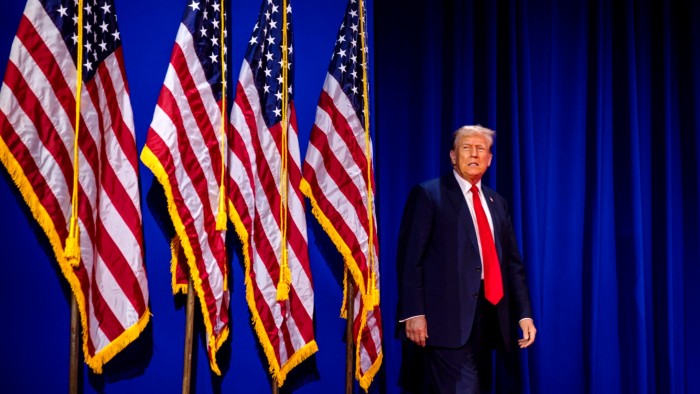When Donald Trump returns to Washington on Wednesday, the president-elect will receive a hero’s welcome from fellow Republicans on Capitol Hill.
“We are going to raise an ‘America First’ banner above this place,” Republican Speaker of the House Mike Johnson told reporters on the steps of the US Capitol this week. “This leadership will hit the ground running to deliver President Trump’s agenda in the 119th Congress.”
Johnson is one of Trump’s fiercest allies in Congress and will be a pivotal ally for the incoming president with a radical agenda. The Republican president-elect wants to slash taxes and regulation, overhaul American healthcare, carry out “mass deportations” of undocumented migrants and slap steep tariffs on foreign goods.
Many of those plans will require sign-off from lawmakers. On a high after a stunning electoral victory, Trump may think that will be straightforward. But several hurdles will need to be cleared.
A week after Trump swept the battleground states and won the popular vote, the balance of power in the legislature remains in flux. To win control of the House of Representatives, one party needs 218 seats. But counting in some districts, especially in California, has been slow. With more than a dozen congressional races yet to be called late on Tuesday, neither Republicans nor Democrats can yet count on victory.
Trump’s party is hopeful. Republicans have already secured the Senate, where they will hold a 53-47 majority starting next year. Johnson thinks the House will follow as well, keeping him in charge.
“We flipped blue seats to red, as we planned, and we kept this majority,” Johnson said on Tuesday. “We still have a number of races outstanding. But we are very optimistic about those . . . we are looking forward to governing in unified government beginning in January.”
If so, Trump’s hold on Washington will be complete, with control of the two congressional chambers plus the loyalty of many of their members, giving him latitude to push through his legislative agenda.
“You have one-party rule, but also you have a Congress where Republicans elected in the past two, four and six years are much more Trump-favourable than those they are replacing,” said Doug Heye, a veteran Republican strategist and former aide to top House Republicans.
Trump has been here before. In the first two years of his first administration, Republicans held both houses, allowing him to push through sweeping 2017 tax reforms. He wants to renew and expand them in his new administration.
Many in Washington expect Trump to exert an even tighter grip on Congress this time, given the unwavering loyalty he commands from several lawmakers, including Johnson and presumably the next Senate leader.
The crucial role of Senate majority leader will be decided on Wednesday, when Republican members of the upper chamber hold a secret vote to choose between John Thune, John Cornyn or Rick Scott. None of them seems intent on locking horns with Trump.
In his first administration, Trump often faced opposition from Mitch McConnell, the Republican majority leader in the Senate at the time, and Paul Ryan, then the House’s Republican Speaker.
Johnson alluded to that friction on Tuesday, insisting the party would be more supportive of Trump this time.
“When President Donald Trump won the presidency in 2016, we all look back and recognise that the Republican party was not fully prepared for that moment, and precious time was wasted in the beginning of that Congress,” he said. “We are not going to make those mistakes again. We will be ready on day one.”
Still, Trump will not have unlimited power over Congress, and Democrats — as well as a handful of moderate Republicans — could exert leverage over his administration in narrow but meaningful ways.
For example, while budget and tax changes, including an extension of the 2017 tax cuts, require the backing of only a simple majority of both chambers thanks to a process known as budget reconciliation, most other legislation will need to break the Senate filibuster — a 60-vote threshold — in order to become law.
That means Senate Democrats could block other Trump legislative priorities — including laws to crack down on immigration at the US-Mexico border, or a repeal the Affordable Care Act, commonly known as Obamacare — unless Senate Republicans take the drastic step of trying to scrap the filibuster altogether, an idea that is likely to struggle to gain traction in the upper chamber.
Meanwhile, in the House Johnson is likely to contend with a razor-thin majority that could put critical votes in jeopardy.
Even as several House races have been called in Republicans’ favour in recent days, Johnson’s possible margins have shrunk further as Trump appoints House Republicans to top administration jobs.
On Monday, Trump selected New York congresswoman Elise Stefanik to be his ambassador to the UN. On Tuesday, he confirmed he had tapped Florida congressman Mike Waltz to be his national security adviser.
That could have significant consequences for make-or-break votes.
“Every single vote counts, because if someone gets ill or has a car accident or a late flight on their plane . . . it affects the votes on the floor,” Johnson told reporters.
The president-elect and his advisers were “attuned” to the delicate legislative maths in the chamber, said Johnson, and he did not “expect” more House members would join the administration. But he quickly added: “I’ll leave that up to [Trump].”
Source link








